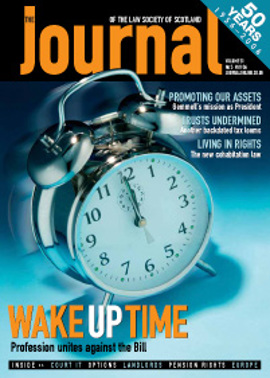Purchase options in leases

The most common circumstance where an option to purchase the landlord’s interest in a property is granted to a tenant is in leases of industrial buildings. Sellers of industrial buildings will often try to avoid a clawback of industrial buildings allowances by granting a long lease to a prospective purchaser instead of conveying the heritable interest in the relevant property. Such long leases will usually be granted with the benefit of an existing occupational lease in place that should produce income for the purchaser.
The maximum period for any new long leases in Scotland is now restricted to 175 years (Abolition of Feudal Tenure etc (Scotland) Act 2000, section 67), and this is usually the term that is selected. The long lease will be granted in exchange for a premium, with the tenant under the long lease being obliged to pay a nominal rent (usually £1 per annum). In such circumstances, it is usual for the tenant to be granted an option to acquire the heritable interest for a nominal sum at a future point in time, when the clawback period for industrial buildings allowances has expired.
Setting out the option
The relevant purchase option is sometimes contained exclusively within the long lease itself. This is however an unsatisfactory situation and not without risk from the point of view of the tenant under the long lease. In terms of Scots law, it is recognised that whilst the ordinary and essential conditions of a lease will run with the property being leased, there may be certain obligations undertaken by the original parties to the lease which are purely personal and which affect only them and their personal representatives (and not successors in title). The general rule is that only conditions that are inter naturalia of a lease run with the leased property. This means that in order to bind a singular successor, the condition must be one commonly occurring in the type of lease concerned.
There is authority for the view that a right to convert a long lease into a feu did not bind successors of the landlord where successors were not taken bound expressly (Bissett v Magistrates of Aberdeen (1898) 1F 87). The generally held view is that a purchase option would not be regarded as inter naturalia of a lease. Accordingly, where the relevant purchase option is only contained in a lease, such may not be binding upon the relevant landlord’s singular successors. See comments of Lord Drummond Young in Advice Centre for Mortgages v McNicoll [2006] CSOH 58. But see also Davidson v Zani 1992 SCLR 1001, a case that has been heavily criticised, which appears to support the view that if a successor landlord is aware of an option prior to purchasing a property it may be barred from objecting to it.
If however the lease contains express wording indicating that successors of the landlord are to be bound by the purchase option, or an express provision obliging the landlord to bind any disponee of the property to the terms of the option, then notwithstanding that the option may not be inter naturalia of the lease, the option may well still be binding on the landlord’s successors. Where the lease contains such a provision obliging the landlord to bind any disponee of the property to the terms of the option, if the landlord sells the property without imposing such a term then he would be in breach of the lease and the purchaser would be in bad faith, having knowledge that the landlord was selling in breach of an obligation contained in the lease. The rule against offside goals in Rodger (Builders) Ltd v Fawdry 1950 SC 483 would therefore apply and the purchase option would as a matter of law be binding on the landlord’s disponee (Advice Centre for Mortgages, above).
Opting for an agreement
Another way of avoiding the possibility of such a purchase option contained in a lease being unenforceable against the original landlord’s successors is for the purchaser always to insist on the relevant purchase option not only being contained within the lease itself but also in a separate option agreement. In terms of that option agreement, the seller should be obliged to take his successor as landlord, bound to grant to the tenant for the time being under the long lease a fresh option agreement in identical terms to the original option agreement whenever there is a transfer of the landlord’s title.
The obligations of the landlord in terms of the option agreement should also be secured by a standard security granted by the landlord over his interest in the property in favour of the tenant. Without such a security, there would always be the possibility of the landlord breaching its obligation to take its successor bound to enter into a new option agreement with the tenant on any sale of the landlord’s interest, or indeed breaching the terms of the option agreement in any other respect. In such an event, the tenant would only have a claim in damages against the defaulting landlord. The existence of the security at least allows the tenant to call up its security and/or to raise an action of foreclosure in respect of the landlord’s interest in the property in the event of there being a breach of the option agreement. On each sale of the landlord’s interest in the property, a fresh standard security should be granted by the successor landlord in favour of the tenant to secure the obligations of the successor landlord in terms of the fresh option agreement to be granted by him.
Acquiring the tenant’s interest
Where a purchaser is acquiring the tenant’s interest in a long lease of an industrial building for investment purposes and it transpires that the purchase option is only contained within the long lease (and not a separate option agreement backed up by a standard security), all is not lost. It may be possible to argue, depending on the actual provisions of the lease, that the wording encompasses successors. If not, it may be possible to obtain from title indemnity insurers an insurance policy to cover the risk of the purchase option not being enforceable against a successor landlord. The downside is that there will be a monetary cost implication in obtaining such cover, although depending on the bargaining position of the parties, this cost should be borne by the seller.
The fundamentals
Whilst the lease structure outlined above seeks to achieve the same result for the purchaser and seller as an outright sale of the heritable interest but without the seller suffering any clawback of industrial buildings allowances, it is fundamental to the purchaser that in agreeing to a structure which assists the seller, he does not leave himself exposed to the risk of being unable to acquire a heritable title to the property at a future date. The recommended course for a tenant’s solicitor in such circumstances is therefore to ensure that the purchase option is contained both within the relevant long lease and also in a separate option agreement, with the landlord’s obligations in terms of said option agreement being secured by a standard security over the landlord’s interest in the property. The long lease should expressly refer to the option being binding on the landlord’s successors and/or expressly oblige the landlord to take any disponee in respect of the landlord’s heritable interest bound to the terms of the relevant purchase option.
David Bell and Professor Robert Rennie are partners in Harper Macleod LLP. For the Commercial Property Practice Group contact David Bell
(t: 0141 227 9318 e: david.bell@harpermacleod.co.uk)
In this issue
- Stand up to be counted
- A bill to divide us
- The pendulum swings
- The pendulum swings (1)
- Cohabitation: the new legal landscape
- The tax man cometh (again)
- The foreign legion
- Making IT happen
- Apportioning and sharing
- Property problems
- Still a profession
- Arguing over agreements
- Next generation law
- Lawyers in the transfer market
- Scottish Solicitors' Discipline Tribunal
- Landlords: setting the mark
- Website review
- Book reviews
- Purchase options in leases






